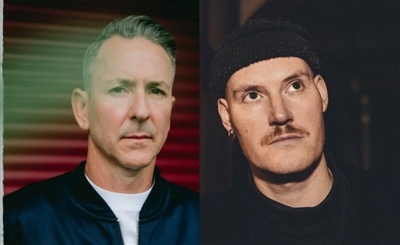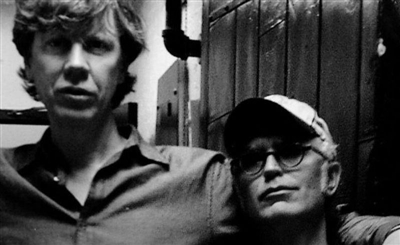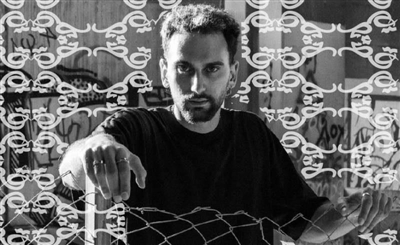Seapunk, Pseudonyms and Mixtapes: An Interview with Kuwaiti Collective Kalibr+
A scene? in Kuwait? It might still be in its relative infancy and battling bureaucracy, but there's been something brewing in the darker corners of Kuwait. One of the forces leading the charge is Kalibr+ - a group of like-minded, left-field music-makers that have amassed a deep library of eclectic releases over the last five years.
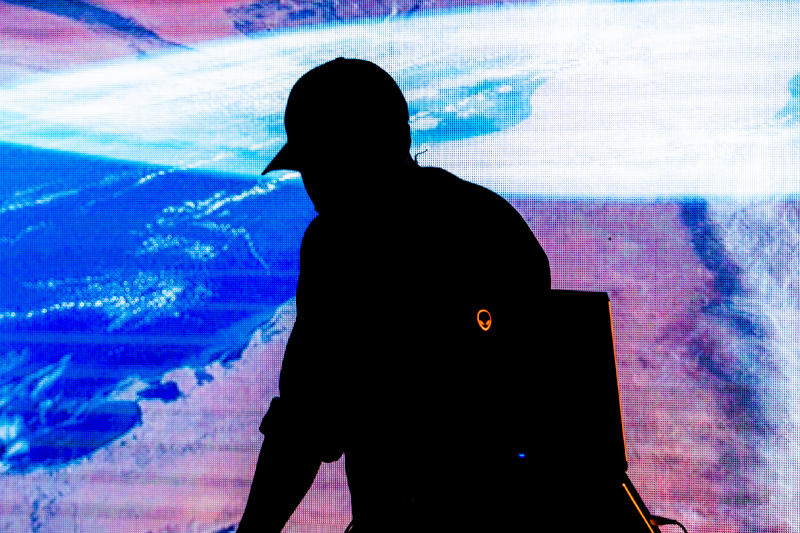
As far as music scenes
in the Middle East go, Kuwait’s generally tends to fly under the radar, far
eclipsed in the news by the country’s financial and political exploits.
By-and-large, Kuwait’s local musicians very rarely have their voices heard
beyond the borders of their own nation.
One night, during an
insomnia-fueled session of algorithm surfing on SoundCloud, I stumbled upon
Kalibr+, a record label and loose music collective operating primarily out of
Kuwait for the past five years. Diving into their extensive discography, I was
met by the sound of an extremely forward-thinking collective with an almost
playful disregard for genre and convention, leaping effortlessly between trap,
techno, glitch, IDM, ambient, baile, post-club, as well as many, many
others.
With members collaborating
together from across all corners of the globe, and a deep archive of over 200
tracks released since the project’s inception, something exciting has clearly
been brewing in Kuwait, completely unbeknownst to those outside the country.
On the eve of the release
of their most recent compilation, the 16-track Pipeline, I sat down with
founder Mohammed, and member Yacoub for an unfiltered conversation about their
art, the dynamics of the music scene in Kuwait, and the challenges of putting
together such an extensive global project.
Let’s start with a brief
history of Kalibr+ - how did this all start?
Mohamed: At the very end of college, I found myself
making a lot of music, and by the time I graduated, more people ended up
joining [the project], and more people ended up liking Kalibr+ than I had
expected, so we just kept going forward with it.
When we first started,
it was myself, my friend Sarah who used to live in Kuwait, her cousin Najeeb,
Morad and our friend Reggie, who also used to live in Kuwait but moved. Talal
had just moved to Canada and was settling in and I didn’t know Phyllis at that
time so they both came into the picture around half a year or so into the
project. There have been a lot of artists involved in Kalibr+, and at that
point we were in a lot of Facebook groups with a large number of musicians, so
a lot of artists were involved in creating what later became Kaibr+.
Yacoub: For reference, Talal’s moniker is CH4INS4W,
Phyllis’ is ‘dvdv’, and Morad goes by ‘Scuba Girl’, but he’s gone by a couple
different monikers in the past. Mohamed also releases music as ‘St. Gold’,
‘Gold Plates’ and ‘Edyth,’ so these are a couple of the names you’re going to
be hearing a lot throughout this interview.
Mohamed: I have like a gajillion names.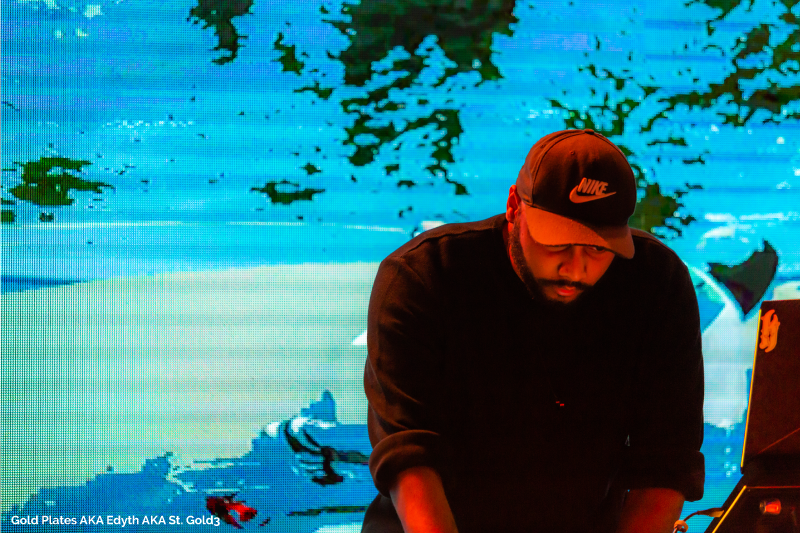
That makes sense,
actually. Going through earlier releases, I kept on hearing a lot of sonic cues
that the music was made by many of the same people, just under different names.
Mohamed: We’re really big fans of the seapunk and vaporwave scenes. There are only about 5-10 artists on the whole vaporwave ‘team’ that release music, but under 5 million aliases. We thought if other people were doing that, why can’t we? We could get away with it doing things online, so why not?<iframe width="100%" height="450" scrolling="no" frameborder="no" allow="autoplay" src="https://w.soundcloud.com/player/?url=https%3A//api.soundcloud.com/playlists/259918297&color=%23ff5500&auto_play=false&hide_related=false&show_comments=true&show_user=true&show_reposts=false&show_teaser=true"></iframe><div style="font-size: 10px; color: #cccccc;line-break: anywhere;word-break: normal;overflow: hidden;white-space: nowrap;text-overflow: ellipsis; font-family: Interstate,Lucida Grande,Lucida Sans Unicode,Lucida Sans,Garuda,Verdana,Tahoma,sans-serif;font-weight: 100;"><a href="https://soundcloud.com/kalibrplus" title="Kalibrplus" target="_blank" style="color: #cccccc; text-decoration: none;">Kalibrplus</a> · <a href="https://soundcloud.com/kalibrplus/sets/k-spotlight" title="K+ Radio [Play On Shuffle]" target="_blank" style="color: #cccccc; text-decoration: none;">K+ Radio [Play On Shuffle]</a></div>
How does that work in practice, when performing live, for example?
Mohamed: I haven't really been performing, it's really,
really difficult to perform here in Kuwait.
Yacoub: We’re up against a lot. It’s very, very
difficult to do any kind of event that’s public, both sexes can attend, and
with music involved. Electronic music is in this really weird gray area where
it’s not illegal, but it’s also hard to get off the ground.
Mohamed: On top of that, electronic music is very niche,
and Kuwait is a country with only about 4 million people.
Yacoub: Although, one of the coolest parts of doing things out here in Kuwait, when we can get it off the ground, is that there's a lot of space to push boundaries. There’s a lot of space to do stuff people have never seen here before, whereas in other markets, you’re pigeonholed. Audiences have already seen most of what can be offered, you know?<iframe width="100%" height="450" scrolling="no" frameborder="no" allow="autoplay" src="https://w.soundcloud.com/player/?url=https%3A//api.soundcloud.com/playlists/995811385&color=%23ff5500&auto_play=false&hide_related=false&show_comments=true&show_user=true&show_reposts=false&show_teaser=true"></iframe><div style="font-size: 10px; color: #cccccc;line-break: anywhere;word-break: normal;overflow: hidden;white-space: nowrap;text-overflow: ellipsis; font-family: Interstate,Lucida Grande,Lucida Sans Unicode,Lucida Sans,Garuda,Verdana,Tahoma,sans-serif;font-weight: 100;"><a href="https://soundcloud.com/kalibrplus" title="Kalibrplus" target="_blank" style="color: #cccccc; text-decoration: none;">Kalibrplus</a> · <a href="https://soundcloud.com/kalibrplus/sets/ch4ins4w-turbo-apocalypse" title="CH4INS4W- Turbo Apocalypse" target="_blank" style="color: #cccccc; text-decoration: none;">CH4INS4W- Turbo Apocalypse</a></div>
I empathise with that, there’s so much bureaucracy - official and unofficial - that you need to go through in order to get any kind of public social event to happen in the Middle East.
Yacoub: Everyone in Kuwait that’s operating in music,
at least that we’re aware of, has to do things a little bit on the fringe. I
don't think there's a single outfit - even ones that have pull with the
National Art Council and stuff - that’s 100% on the books with permits and that
sort of bureaucratic system. It’s part of the deal here, and we’ve adjusted to
it.
Paint me a picture of
what the music landscape looked like in Kuwait, pre-corona.
Yacoub: There was a lot of stuff happening, whether
it’s all good or all bad is up to interpretation. I don't listen to techno, but
there are a couple really technically proficient techno DJs, who pulled off
very organised, very big production events and threw these crazy underground
raves that you hear about every now and then. Blues and rock music are still
pretty popular, and there’s a couple rock bands still operating. But it really
depends.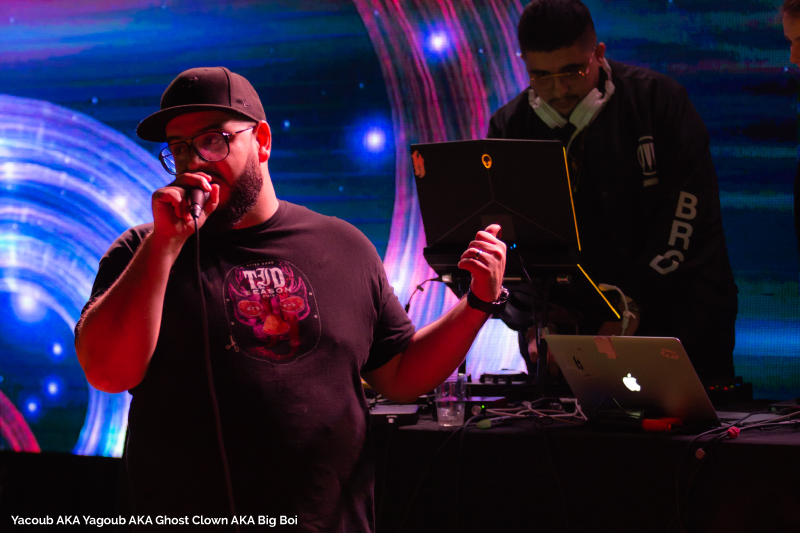 What do the crowd’s in
Kuwait tend to go for?
What do the crowd’s in
Kuwait tend to go for?
Yacoub: Here in Kuwait, it’s not very often that people
are able to go out and enjoy music. So, when the weather is nice, everyone
suddenly wants to go out. It’s not just enough to put together a nice stage,
nice lighting, food, a good sound system with good musicians. The crowds want
more, and they show up expecting the night of their life. If they don't have
the exact experience, they gassed themselves up to have, for whatever reason,
you will never see them again, no matter what kind of show you put on.
Mohamed: You’d need a full festival-type feel, in a way
that doesn't resemble the European model. It has to be family friendly, there
has to be food, freedom to move around. The people that succeed here, in
whatever shape or form, abide by that or try to find creative ways to make a
living. You’d have DJs that play on the radio, but also in cafes, or at family
events etc. This is how they string together shows in order to make money.
Not a lot of people take
that path, but there are people who do and are successful. I’m in a group with
Saudi musicians who are doing really remarkable things. They’re not only DJing,
but making livings off of workshops and giving lessons. There are analog synth
nerds giving these workshops, and getting accepted into the established Arab
music societies and institutions that used to just be people who play classical
Oud.
So where does Kalibr+ fit into the Kuwaiti ‘scene’, in terms of genre?
Yacoub: It’s really hard to describe. When I was doing
the write-ups and stuff for the promotion of Pipeline, I came
across a lot of different genre names that I hadn’t heard of before. I only
heard the term ‘post club’” for the first time about a month ago. These genre
titles are arbitrary, but on a practical level, it lets the consumer know what
it is that they’re consuming.
Mohamed: It really comes down to how you promote it,
right? If I’m going to try and get the music on a playlist, or if we’re going
through curators, they're going to want to use industry terms. They’re going to
ask: “Is this urban? Is this world [music]? Is this global bass?”
You have to pick those
terms up, or else you end up in a situation where you send the wrong music to
the wrong curators. You have to spend the time categorising things, or finding
new ways to market your music so that it has a little more appeal.
Mohamed: You’re forgetting [arguably] the biggest ‘scene’ in Kuwait, which is Iraqi music. There are people making hybrid mixes [of this music], and there used to be a large mixtape culture. When I think of Kuwait’s music scenes, I think of the mixtape culture. You used to be able to go to stores and get mixtapes of DJs mixing reggaeton with Iraqi. We don't have these [mixtape] stores anymore, but all those DJs are on YouTube now.<iframe width="800" height="450" src="https://www.youtube.com/embed/TesSCfk6z_4" frameborder="0" allow="accelerometer; autoplay; encrypted-media; gyroscope; picture-in-picture" allowfullscreen></iframe> Mohamed: You find those DJs playing in some of the weirdest places. It could be at a chalet, or some sort of farm, or you could hear it being played on the radio, or in someone's car.
Yacoub: In a Silverado somewhere in the desert.
Mohamed: They’d be the wildest mixes, combining Iraqi
with Dabke, or mixing it with top-40 pop music. I know there are similar things
in Egypt, so imagine the Kuwaiti version of that.
Yacoub: The mixtape scene was really cool because all
these DJs would have their own storefront named after them. DJ Crow would have
the ‘DJ Crow Store,’ and you’d go there and find a big bookshelf of mixtapes.
Mohamed: It’s also all underground, by default. It has
to be. No one’s allowed to exist on the surface, which creates this really cool
dynamic because everyone has to abide by a certain set of cultural rules, but
at the same time, they have a lot more wiggle room to be creative with who they
are, with their persona on social media. Some are flashier than others, some
aren't, and it’s become a really cool counterculture.
With Kalibr+, it’s clear
that you’re very open to a diverse range of sounds and genres. Do you feel like
you guys are settling into a sort of jack-of-all-trades role with your
releases, or is there a specific direction or sound you’re working towards?
Mohamed: The way I see it is that we’re always going to
make what we feel like making. Nowadays I’m finding genres that I want to focus
on more than others. I really love glitch, dub and ambient music. You’ll find
that littered around a lot of my work.
Maybe that will go somewhere down the line, if I decide I want to put a full ambient record out. For the most part if I wake up and I’m like, “I want to make trap today,” or “I want to make Afrobeat.” Sometimes we just want to pick up a guitar and just make a lot of noise, or metal.
<iframe width="100%" height="450" scrolling="no" frameborder="no" allow="autoplay" src="https://w.soundcloud.com/player/?url=https%3A//api.soundcloud.com/playlists/1045536955&color=%23ff5500&auto_play=false&hide_related=false&show_comments=true&show_user=true&show_reposts=false&show_teaser=true"></iframe><div style="font-size: 10px; color: #cccccc;line-break: anywhere;word-break: normal;overflow: hidden;white-space: nowrap;text-overflow: ellipsis; font-family: Interstate,Lucida Grande,Lucida Sans Unicode,Lucida Sans,Garuda,Verdana,Tahoma,sans-serif;font-weight: 100;"><a href="https://soundcloud.com/kalibrplus" title="Kalibrplus" target="_blank" style="color: #cccccc; text-decoration: none;">Kalibrplus</a> · <a href="https://soundcloud.com/kalibrplus/sets/xian" title="Edyth- Xian" target="_blank" style="color: #cccccc; text-decoration: none;">Edyth- Xian</a></div>It’s interesting you mention that, because I heard a lot of metal influence deep in your SoundCloud.
Mohamed: I think pretty much everyone in the group is a
[former] metal head. We all grew up on hardcore and sludge metal. It might not
show on our released music, but we all really love metal.
Yacoub: When I first met Mohamed, we’d just chain smoke
cigarettes in my basement and listen to hardcore music.
Mohamed: We did that for about three months before we did
any musical projects together, and then [after some time] we were like, “we
should probably put a show together or something.” It always goes back to heavy
metal.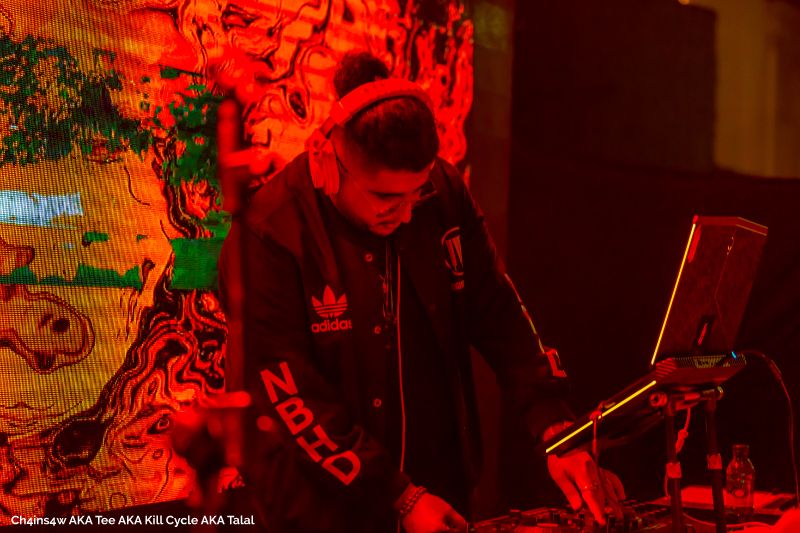
Tell me a little bit
about the latest Kalibr+ release, Pipeline - it’s the third one, right?
Mohamed: Officially it’s the third, but I consider it
the fourth. We first released Carbon Social, first, which was kind of
rough around the edges, but very fun to make. We released Midnight [after
that] and then Carbon Social 20XX, followed by this release, Pipeline.
Yacoub: It’s bigger and badder than anything Kalibr+
have put together, in my opinion. And the cool thing is that the music already
released is pretty big and bad already. I feel like Pipeline is the most
self-realised project Kalibr+ have put together, and it’s pretty obvious that a
team put it together, know what I mean?
<iframe width="100%" height="450" scrolling="no" frameborder="no" allow="autoplay" src="https://w.soundcloud.com/player/?url=https%3A//api.soundcloud.com/playlists/1073863222&color=%23ff5500&auto_play=false&hide_related=false&show_comments=true&show_user=true&show_reposts=false&show_teaser=true"></iframe><div style="font-size: 10px; color: #cccccc;line-break: anywhere;word-break: normal;overflow: hidden;white-space: nowrap;text-overflow: ellipsis; font-family: Interstate,Lucida Grande,Lucida Sans Unicode,Lucida Sans,Garuda,Verdana,Tahoma,sans-serif;font-weight: 100;"><a href="https://soundcloud.com/kalibrplus" title="Kalibrplus" target="_blank" style="color: #cccccc; text-decoration: none;">Kalibrplus</a> · <a href="https://soundcloud.com/kalibrplus/sets/pipeline-kalibr" title="Pipeline [Kalibr+]" target="_blank" style="color: #cccccc; text-decoration: none;">Pipeline [Kalibr+]</a></div>Yacoub: Kalibr+ is basically a collaboration on all fronts, especially with the compilations. The art, the marketing, the release strategies are all a collaborative effort with everyone onboard, with both the artists and even a couple people on the outside of our ‘circle.’
Yacoub: If you go back and listen to the other
compilations, Pipeline is the one that really feels like Kalibr+ had a
system in place. With the other compilations it seemed like they were
developing this system, but Pipeline was like a conveyor belt; we worked
hard on organising it, and then executed it well with that organisation. On
every front, it’s just ‘razor blades’, it’s cleaner than anything else we put
out.
Looking at the way you
have packaged your releases, it’s clear that you’re more confident with it now,
and there’s an obvious trend of improvement and refinement. Did you feel like
upping the scale for this release a conscious goal?
Mohamed: This particular compilation took us a while to
release, because we had so much fun creating it. This was something that we did
out of love, not necessarily as a way to push or market ourselves. Everyone in
Kalibr+ has a career outside of it, and the record spent nearly a year in
‘hibernation mode’ because of that. Just having people take part in the
compilation was really amazing.
Abbi Press, for example, is really talented but has a full-time job, so It’s amazing that she had the time to make the track ‘Shutdown’ and let us use it on the compilation. Azzam (Kadisa) is like a ghost sometimes. I had to go to his house and physically take the track ‘Headchop’ off him; we worked on the track for a day and then I was like “ok cool, I’m taking this.” I don’t think he would have given us the track any other way, and Pipeline is one of those compilations where each track has its own story, and a long process behind it.
Even the mastering has a story behind it. Morad (Scuba Girl) lives in Georgia (USA) right now, and works as a nurse. He’s on the frontlines of the pandemic and still used his free time to master the project. A lot of time and sacrifice went into making Pipeline, and we spent such a long time making it, so we figured, “let’s give it our best shot, and just see where it goes.”<iframe width="100%" height="450" scrolling="no" frameborder="no" allow="autoplay" src="https://w.soundcloud.com/player/?url=https%3A//api.soundcloud.com/playlists/1020454675&color=%23ff5500&auto_play=false&hide_related=false&show_comments=true&show_user=true&show_reposts=false&show_teaser=true"></iframe><div style="font-size: 10px; color: #cccccc;line-break: anywhere;word-break: normal;overflow: hidden;white-space: nowrap;text-overflow: ellipsis; font-family: Interstate,Lucida Grande,Lucida Sans Unicode,Lucida Sans,Garuda,Verdana,Tahoma,sans-serif;font-weight: 100;"><a href="https://soundcloud.com/kalibrplus" title="Kalibrplus" target="_blank" style="color: #cccccc; text-decoration: none;">Kalibrplus</a> · <a href="https://soundcloud.com/kalibrplus/sets/scuba-girl-swim-team" title="Scuba Girl- Swim Team" target="_blank" style="color: #cccccc; text-decoration: none;">Scuba Girl- Swim Team</a></div>
Being spread out all over the globe in the way that you are, is there a shared understanding/vision of what Kalibr+ is?
Mohamed: I feel like, yes, but loosely. I think we do
have overlaps in music, but I don't know if that ended up happening because
we’ve been around each other for so long. We all seem to love seapunk a lot,
and we don’t really know why. We all just love the aesthetic of PS1/PS2
graphics, you know? Really bad CGI skies, things flying through the air, stuff
like that. I think that’s something we have in common; the really outdated
aspects of Japanese culture that you see in PS1 games. That’s pretty much most
of what ties us together - a love for that PS1/PS2 culture.
That’s really funny to
hear, I had noticed that you put the racing ships from the game WIPEOUT on the
cover art for Carbon Social 20XX...
Mohamed: Yeah, when we first came up with that idea, we
all unanimously agreed “yes, this is the idea we’re going to go with.”
Yacoub: When I first met Mo, the very first thing I
asked him was: “yo, was that whole compilation based off the
WIPEOUT: XL soundtrack?” He replied with
“yeah, pretty much,” which was such a deep cut for me, because I thought I was
the only lunatic who played a burned CD copy of that game as a child. It was
shocking to see that Kalibr+ was modelling a whole compilation off of this
weird, obscure reference.
<iframe width="100%" height="450" scrolling="no" frameborder="no" allow="autoplay" src="https://w.soundcloud.com/player/?url=https%3A//api.soundcloud.com/playlists/637407252&color=%23ff5500&auto_play=false&hide_related=false&show_comments=true&show_user=true&show_reposts=false&show_teaser=true"></iframe><div style="font-size: 10px; color: #cccccc;line-break: anywhere;word-break: normal;overflow: hidden;white-space: nowrap;text-overflow: ellipsis; font-family: Interstate,Lucida Grande,Lucida Sans Unicode,Lucida Sans,Garuda,Verdana,Tahoma,sans-serif;font-weight: 100;"><a href="https://soundcloud.com/kalibrplus" title="Kalibrplus" target="_blank" style="color: #cccccc; text-decoration: none;">Kalibrplus</a> · <a href="https://soundcloud.com/kalibrplus/sets/carbonsocial20xx" title="Carbon Social: 20XX" target="_blank" style="color: #cccccc; text-decoration: none;">Carbon Social: 20XX</a></div>
When things in the world open up again, and return to some sense of normalcy after corona, what do you hope to see for Kalibr+ in this next period.
Yacoub: Speaking for myself personally, I would love to
see more gigs happen. We put together two shows last year, and I had a blast
putting them together and executing them.
We sold a lot of
individual tickets for that show, and a lot of people came to the show alone.
They hung out, vibed, had a good time, and we ended up meeting a bunch of
people that we still talk to and hang out with. I think there’s a very nice and
healthy enclave of people here that can keep a scene like this alive.
It’s really cool that we
do actually have enough people here in Kuwait that can keep something like that
alive. I really believe that it’s just a matter or trying to decide how we’re
going to go about [making events happen], and I’m interested to see, once
things are back on track, how easy or difficult it’s going to be to throw these
kinds of musical events.
You have to keep in mind
that we’re right next to Saudi Arabia, which went from about 500 years of iron
conservatism to having Carnage perform for 150,000 people last year, you know?
Afrojack lives in Riyadh now or something. It’s very weird, and there's a lot
of weird stuff going on.
Yacoub: In the Gulf, a lot of the moves we make in
music are based on the moves Saudi Arabia makes. Whether we like it or not,
it's a fact. All of that was starting to snowball into something really
interesting right as Corona hit. In Kuwait, we now have an arena that’s
operated by Live Nation, we have our own Ticketmaster website. A few years ago,
we had nothing like that, and if you had told me I wouldn't have believed
it. 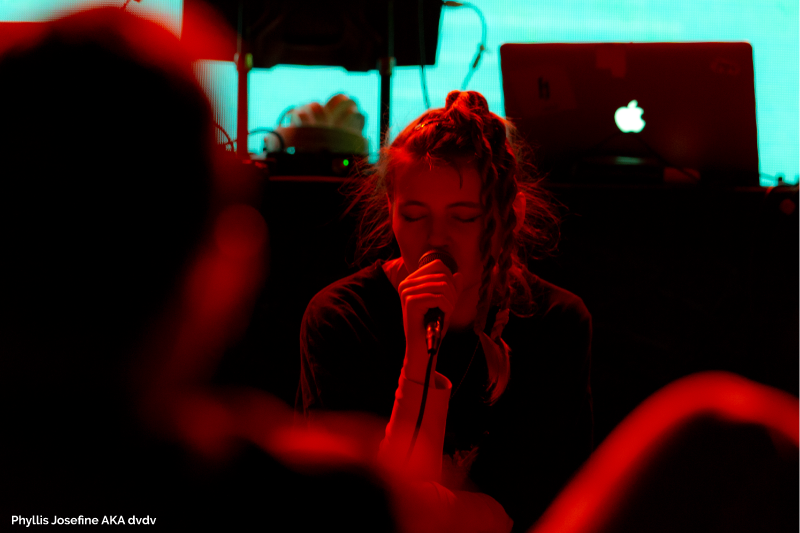
I feel like Saudi Arabia is a pretty good marker for whether something is permissible or not, you know? You have to wait till Saudi Arabia books Armin Van Buren in a massive stadium in order to be like, “ok, dance music is halal now.”
Yacoub: My concern with Saudi Arabia is that the model
they’re using is not sustainable. They’re the only Arab country that has the
government’s 100% support for putting together these shows. Each kingdom has
its own art season; there's Riyadh art season, Jeddah art season, etc, and
they're all competing for who can throw the biggest, baddest, craziest shows.
Since they're using Saudi Arabian government-backed budgets, they're not
worried about the costs, especially not for these first couple years; they're
trying to attract people from around the world to look at them as potential
vendors, as potential booking agents, or even as potential artists as
well.
The problem with that
model is that it's not sustainable; you can only hemorrhage money on every
single gargantuan show for a certain number of years before they realise that
they're bleeding their economy. It doesn't make any sense.
Another issue we face
here in Kuwait is being able to [pay an artist the amount that Saudi Arabia
does]. For example, if ‘artist X’ is playing a show in Saudi Arabia for five or
six times what their normal asking rate, when a promoter in Kuwait tries and
book the same artist they can't offer the same rate, so the artist is going to
be like: “why would I play a show in Kuwait when Saudi Arabia pays more?” So in
a way, their actions still hurt our scene.
Is there a better way to
be going about things, in your opinion?
Mohamed: Maybe I’m wrong, but I think the way we as
promoters try and push electronic music isn’t close to how a huge portion of the
people in the Middle East want to experience music. So, if you're trying to do
things with the ‘European model’, that probably won’t work. The Middle East
never really upheld the ‘European model’ in terms of musical culture, so trying
to [go about] things that way just doesn't work.
So, to see success for
musicians in the Middle East, we kind of need to look towards the more Shaabi
musicians and see how they do it, how they've come up with their own models for
success.
Have there been any
musicians from the MENA, outside of Kuwait, that you've interacted with
positively, or admire?
Yacoub: I think all the Egyptians musicians that I've
ever personally dealt with have been kickass. Do you know Bosaina?
She came out to Kuwait A
couple of years ago, and I've been following her since. Her set was one of the
most punk rock things I've ever seen. It was just her, a laptop and a tiny loop
station. There were no rules and there was zero structure to anything she did.
It was awesome. She just came out dressed like a stewardess. I thought she
worked for the venue.
And then she just got on stage and literally clawed everybody's face off. She did it without even like, breaking a sweat. It was one of the coolest things I've seen to this day, it really was.
Wild. Before we wrap up,
are there any last words you’d like to share?
Mohamed: Have fun with it, because if you're not having fun doing it there's no point. There are people who are really creating the most interesting art and, for whatever reason, the world doesn't get to experience that. No matter what kind of art you’re making, whether it’s underground or mainstream, whether you're seeking success, fame or money. Whatever you create, just create it and put it out into the world, and don't stop.
Follow Kalibr+ on SoundCloud, Bandcamp, Instagram and Facebook.
- Previous Article test list 1 noise 2024-03-13
- Next Article Drake Rapping in Arabic on a UK Drill Track Has the Internet in Meltdown
Trending This Month
-
Jan 29, 2026



